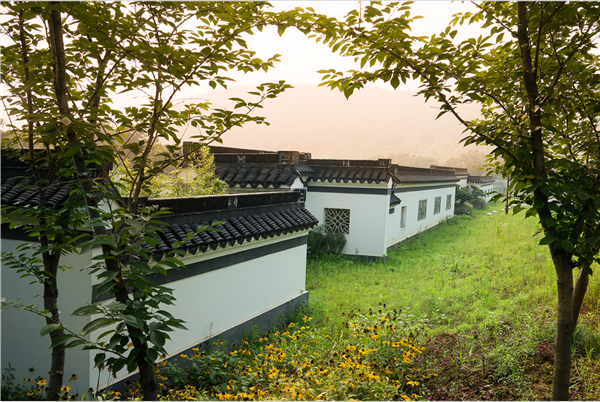Learning lessons in natural living in nature's classroom
 |
|
Huaxia Baosheng Park in Jintan, Jiangsu province, has developed into a leisure resort for visitors to experience nature since its opening last year. YANG FEIYUE/CHINA DAILY |
Museums. Tea gardens. Recreational-vehicle campsites.
And villas for those hoping for a more luxurious life on the road.
The Huaxia Baosheng Park is a green destination in Jintan's Maoshan Mountains, where eco-tourists learn lessons they take with them when they leave.
That is, perhaps, devastated biospheres, such as this swath of Jiangsu province, can be redesigned and revived rapidly.
Trees line the road to the destination.
Dewdrops play percussion on the forest floor when winds or visitors jostle bamboo groves.
Shake. Shudder.
Pitter. Patter.
Tip. Tap. Ad infinitum.
It's truly natural beauty. At its purest.
Mist wafts from lakes, twisting over the landscape to create a mystical feel.
Huaxia Baosheng has evolved from a timberland into a leisure resort for nature lovers since it opened last year.
It's a place where the whole point was to cut down trees that suddenly transformed into a place where the point is protecting them.
A quick switch.
One that represents a changing China.
The park's management "didn't much interfere with the original landscape", says deputy director of marketing, Zhou Kun.
One major reconfiguration has been the planting of many leafy plants, including over 4,000 camphor trees.
"Nearly all flora are evergreen and convey springtime in all seasons," Zhou says.
A 20-hectare tea garden offers harvesting experiences for visitors in March.
They can learn about the leaves' multiple dimensions, from the botanical to the cultural. They can witness tea processing and sip a cup of the final product.
About 10,000 travelers visited during the National Day holidays in the first week of October, when the park opened, Zhou says.
Many arrive from Jiangsu's Changzhou and the provincial capital, Nanjing, Zhou says.
Most come in the spring and autumn and stay one night. Hotels are often fully booked during holidays.
They hike and enjoy fresh air. They peruse museums dedicated to nature, art, bonsai and tea.
The nature museum hosts over 4,000 items, including mineral specimens and animal fossils.
Its Permian ichthyosaur swims motionlessly through 15 meters of rock. It's reportedly one of China's biggest and best preserved. The establishment displays three mammoth skeletons and eight sets of dinosaur remains.
About 500 potted bonsai belong to over 100 species at the bonsai museum. The art museum hosts replicas of 100 globally acclaimed oil paintings, and Chinese calligraphy, ink works and woodcarvings.
Its educational institutions are a natural place to study - set in woodland that is an institution in itself in which to learn about nature.
yangfeiyue@chinadaily.com.cn














